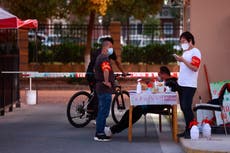Sealed doors and tensions boiling over: American expat reveals reality of Shanghai’s citywide lockdown
The coastal city of 25 million people is at the heart of China’s recent Covid surge
An American expat in China has been using her social media platforms to document her lived experiences of weathering a Covid-19 lockdown in her second-home of Shanghai, where the restrictions aimed at containing a recent Omicron surge were so severe this week it forced the US State Department to order all non emergency consulate employees to leave the city.
“Stuff in Shanghai is literally changing everyday. Media reporting is often several days behind the current situation,” Chaniece Brackeen wrote in a tweet on 9 April, a day after China reported over 20,000 new Covid-19 cases, a number that far outpaces the earlier peak set in Wuhan at the onset of the pandemic.
Shanghai, a city of more than 25 million people at the heart of China’s latest virus surge, went into a staggered lockdown on 27 March, but this approach was quickly abandoned for a citywide measure on 31 March.
Until Monday, when the government announced that 40 per cent of the city’s neighbourhoods would see some these restrictions eased, all residents were forbidden from leaving their neighbourhoods and were visited regularly by hazmat-suited community workers knocking on doors for mandatory tests, Nikkei News reported.
In one of Ms Brackeen’s viral Tiktoks, posted on 3 April and collecting more than 1.8 million views, she details how stress inside their building had hit a fever pitch, with neighbours in their hallway beginning to brush up against the volunteers collecting tests.
“It seems tensions are running high,” she narrates over a video of a man standing in his door frame, shouting at someone off-camera. “Here you can see someone arguing with a volunteer.”
Her videos have also provided insight into the tedium of what the daily routines have been like for residents in Shanghai in recent weeks.
In one video, she expresses delight at a delivery of vegetables, while in another she reflects on the envy she feels towards some of the delivery drivers or people with access to outdoor space, as for most of the lockdown, the only time residents were permitted to venture outside their four walls was for a Covid test or to reprieve their pets, but even then only briefly.
“It’s hard not to be envious of delivery people and people with balconies,” she said. “I also noticed more delivery drivers,” she said, noting that “some had been set up at a hotel across the street”.
A CNN correspondent, similarly locked in the financial hub turned ghost town, said during an interview relaying his experiences to the network that he’d been forced to ration his food because grocery delivery services and the government’s handouts had been ground to a crawling pace with the citywide restrictions.
“If you think Wuhan 2020 was bad, welcome to Shanghai 2022,” CNN reporter David Culver relayed. “This has been like no other lockdown. And it’s in the country’s cosmopolitan and most affluent financial hub, of all places.”
The Shanghai-based correspondent later wrote that measures to ensure residents were staying indoors and following the rules had led to his own door being taped, allegedly by authorities he said.
“I can’t go outside that door, there’s a seal. If I do, physically I could do it, but I would break the seal, and there’s repercussions for that,” Mr Culver wrote.
Though the recent surge is still considerably lower than most country’s daily record cases, China, who has fully vaccinated more than 88 per cent of its 1.4 billion populace, has adhered throughout most of the pandemic to a zero-Covid policy.
This policy, however, has been challenged by experts who say its efficacy is waning since the introduction of the highly transmissible Omicron variant.
“China’s policy will fail to contain infections, leading to larger outbreaks, requiring in turn more severe lockdowns. This will in turn lead to greater economic disruptions, more state intervention,” reads a report published by US-based consultancy Eurasia Group, who flagged China’s zero-Covid policy as one of the top risks of 2022.
A total of 7,565 neighbourhoods in Shanghai that recorded no new cases over the past two weeks were recently designated as “prevention areas” according to city official Gu Honghui, Nikkei News reported.
Though this means that some residents were permitted to travel outside of their homes, they are still prohibited from leaving their predetermined boundaries and are still asked to avoid any unnecessary outings.
Despite the gradual reopening, infections in the coastal city have shown little sign of staving off. On Sunday, there were 26,087 local infections reported, a figure that tops all previous records for the 10th day in a row.
The Independent contacted Ms Brackeen for comment but did not receive a response before publication.
Join our commenting forum
Join thought-provoking conversations, follow other Independent readers and see their replies
Comments


Bookmark popover
Removed from bookmarks